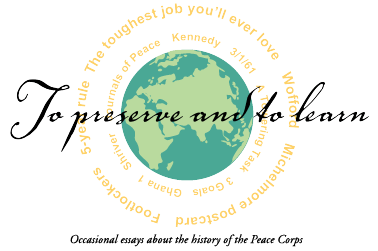The Placement Test for PCVs

In the early days of the Peace Corps there was a Placement Test given to all applicants. Actually it was two tests. A 30-minute General Aptitude Test and a 30-minute Modern Language Aptitude Test. The areas of testing were in Verbal Aptitude, Agriculture, English, Health Sciences, Mechanical Skills, Biology, Chemistry, Physics, Mathematics, World History, Literature, United States History and Institutions, and Modern Language Aptitude. One-hour achievement tests in French and Spanish were also offered during the second hour. The instruction pamphlet that accompanied the tests said that the results would be used “to help find the most appropriate assignment for each applicant.”
For those who missed the opportunity to take the tests, which were given — as best I can remember — from 1961 until around 1967, I am including a few of the questions. Lets see if you could still get into the Peace Corps back then.

- Verbal Aptitude
The question below consists of a word printed in capital letters, followed by five words or phrases lettered A through E. Choose the lettered word or phrase which is most nearly opposite in meaning to the word in capital letters.
LABORIOUS:
(A) stationary
(B) free
(C) automatic
(D) common
(E) easy
- Agriculture
After a seven year period of drought, an area had so much rain that floods were common. However, farms in these areas were still considered to be drought-stricken because
(A) Farmers had not had time to plant and harvest any crops
(B) The water table had not been raised significantly
(C) The economic losses had not been made up
(D) The floods had washed away the topsoil
(E) The large reservoirs had not yet been filled to capacity
- Mechanical Skills
In this part solve the problem, using any available space on the page for scratchwork. Then indicate the one correct answer in the appropriate space on the answer sheet.
What does 28 feet of wire weigh, if 154 feet weighs 11 pounds?
(A) 2 lb.
(B) 28/11 lb.
(C) 11/2 lb.
(D) 7 lb.
(E) 14 lb.
- United States History and Institutions
Upon which of the following did Jefferson base his argument for American independence in the Declaration of Independence?
(A) The rights of the colonists as Englishmen and British subjects
(B) The natural rights of man everywhere
(C) British neglect of the American colonies
(D) The absence of a written British constitution
(E) Britain’s indiscriminate disregard for procedural rights
- Literature Test
- “The Hero as Divinity, the Hero as Prophet, are productions of old ages; not to be repeated in the new. They presuppose a certain rudeness of conception, which the progress of mere scientific knowledge puts an end to. There needs to be, as it were, a world vacant, or almost vacant of scientific forms, if men in their loving wonder are to fancy their fellow-man either a god or one speaking with the voice of a god.”
On the basis of content and style, the passage can be judged to be the work of:
(A) Swinburne
(B) Arnold
(C) Carlyle
(D) Macaulay
(E) Ruskin
- ‘Tis late to hearken, late to smile,
But better late than never:
I shall have lived a little while
Before I die for ever.
Among other things, in these lines the poet is expressing his belief that
(A) a man should counterfeit cheer in preparing himself for death
(B) life is bitter, but must be endured
(C) old age makes a man impatient for death
(D) it is never too late to repent one’s misdeeds
(E) there is no life after death
- Health Sciences
The question below is followed by five suggested answers. Select the one which is best.
Which of the following would be the most satisfactory nutritional substitute for fresh orange juice?
(A) Fresh apple juice
(B) Fresh carrot juice
(C) Bottle prune juice
(D) Canned pineapple juice
(E) Canned grapefruit juice
- Physics
A helium-filled toy balloon is tied by a 3-foot string to the bottom of a closed box so that the balloon occupies the exact center of the box. The box is then given a sudden shove. While the box is accelerating, the position of the balloon is
(A) in back of its starting position
(B) in front of the center of the box
(C) between the center of the box and its starting position
(D) at the center of the box
(E) at its starting position
- World History
“The Calvinists were inclined to a democratic outlook by the circumstance that, for the most part, they remained a minority and were thus not able to prescribe the mode of life and religion of a whole region.”
Which of the following was probably among the regions which the author had in mind when he made this statement?
(A) Scotland
(B) France
(C) The Dutch Netherlands
(D) Geneva
(E) New England
Answers: 1. (E) 2. (B) 3. (A) 4. (B) 5a. (C) 5b. (E) 6. (E) 7. (B) 8. (B)


I remember doing the language test as a puzzle and did well. In fact I was horrible at languages and what was I to learn? Amharic!
When I applied in late 1966/early 1967, I don’t remember having to do this test. We did not do it in orientation in Philadelphia in July of 1967 either. However, I served in the Dominican Republic (DR) following their 1965 Revolution, and several of the invited group were Political Science majors with a focus on Latin America, which was why we were told we were invited to serve in the DR.
What happened to the Modern Language Aptitude question?
I took this test in 1965. My college roommate at the time, had taken then test the semester before I did. He old me about the language aptitude test, They give you a bunch of vocabulary words in a made-up language and then give you a vocabulary test. He told me that the only word he remembered was “roo”, which he said meant “art. I went to the test thinking I had an ace up my sleeve, but alas, in my version there was no “roo”. Now almost 60 years later, I still can’t forget that stupid word.
What happened to the Modern Language Aptitude question?
I took this test in 1965. My college roommate at the time, had taken the test the semester before I did. He told me about the language aptitude test, They give you a bunch of vocabulary words in a made-up language and then give you a vocabulary test. He told me that the only word he remembered was “roo”, which he said meant “art. I went to the test thinking I had an ace up my sleeve, but alas, in my version there was no “roo”. Now almost 60 years later, I still can’t forget that stupid word.
I don’t remember much about the test I took along with about 100 intensely motivated people in the Spring of 1962, but it certainly wasn’t the one whose excerpts are cited above (thankfully). The language portion used vocabulary from a tongue like Urdu, which clearly demonstrated an ability to grapple with the Dominican version of Spanish upon arrival in Santo Domingo in early 1963.